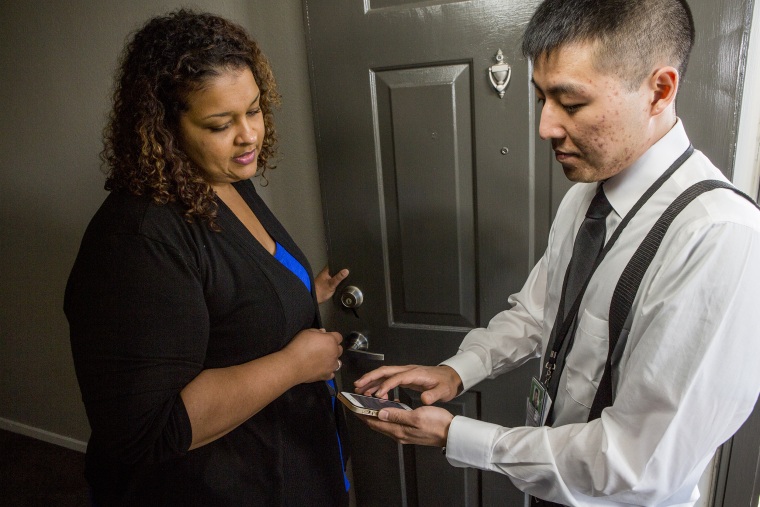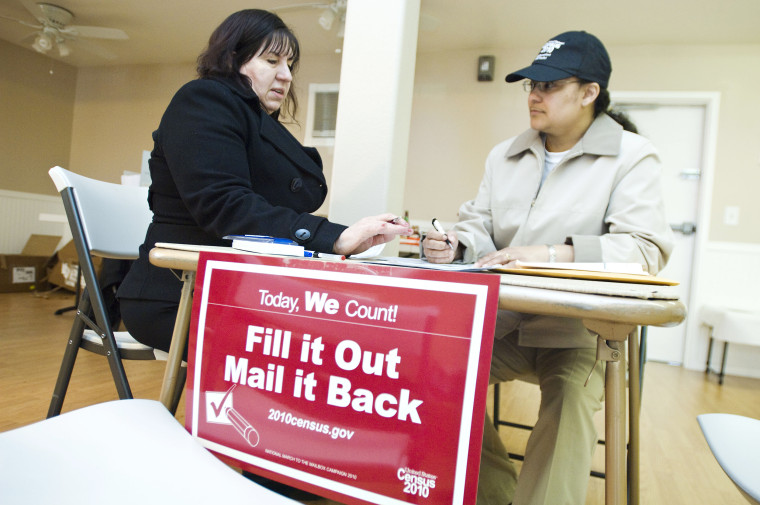Uncertainty surrounding the Trump administration's plans to add a citizenship question to the 2020 census is just one of a number of critical issues plaguing the U.S. Census Bureau, the U.S. government's primary watchdog warned, and time is running out to fix them before that all-important headcount.
“The ticking clock has become the enemy of the Census Bureau. There’s no reset, no do-ever, no timeout,” Robert Goldenkoff, a director of strategic issues at the Government Accountability Office, said. “Failure is not an option, the Census Bureau has to get it right. If there is a mistake, it’s a 10-year mistake.”
In a series of reports over the past year, the GAO has sounded the alarm about budget woes, potential cyber-security weaknesses, hiring shortfalls, testing cutbacks, a bankrupt printing company, and the ongoing legal battle over whether a citizenship question can be included on the form — all problems that could impede the accuracy of the agency's critical work.
But after the GAO released its latest report last week of the bureau’s final dress rehearsal before showtime in 2020, a fuller picture emerged of the dire crunch the agency is under to avoid a logistical breakdown. Conducted every 10 years, the census is required by the Constitution. The results determines the number of seats in the House of Representatives each state gets, and impacts the dispersal of billions of federal dollars, among other things.
Goldenkoff told NBC News in an interview that the overall picture of the 2020 census appears alarming because of “shortcomings” in vital areas that complicate the bureau’s ability to collect accurate data.
“At some point, they have to switch the flip and execute the census and the Census Bureau has a lot on its plate,” he said. “There are a lot of operational issues that need to be addressed.”
The bureau has cut back on crucial testing in different parts of the country, has had trouble attracting qualified workers and is lagging behind getting its IT and cybersecurity systems fully operational before it adds — for the first time — the ability for people to take the census online, Goldenkoff said.
And if the bureau does not address those issues quickly, it could lead to collecting bad data, which will have implications for a decade.
Limited tests, budget woes, hiring shortages, bankruptcy
The bureau must count the population by April 1, 2020, deliver state counts to President Donald Trump by December 31, 2020, and provide redistricting data to the states by April 1, 2021.
But there are a series of issues that could complicate that timeline.
The bureau had planned to conduct two important field tests, particularly in Washington state and rural counties in West Virginia with limited access to high-speed internet, but those tests were soon scrapped. The primary field test this year was conducted in Rhode Island, but that introduces its own set of problems because it is a small state that gives the bureau a limited picture of the country.
“To really conduct a robust test you test it under all sorts of demographic and geographic conditions,” Goldenkoff said.

The bureau also faces a hiring crunch. Because of a tighter labor market compared to 2010, hiring staff needed to reach small and hard-to-count communities has become a problem for the bureau. The GAO, for instance, found that bureau officials reported smaller than expected pools of applicants for key positions and also has had to deal with declined job offers and turnover.
Meanwhile, on the technology front, costs have gone up from $3.4 billion to $4.8 billion for IT alone because the bureau underestimated costs and have outsourced much of the IT work to third-party contractors.
The 2010 census was the costliest in U.S. history — clocking in at $12.3 billion — and the 2020 census could exceed that number despite the bureau’s plan to automate much of its functions, such as allowing people to take the census online.
“As the schedule slips, the schedule gets compressed that's going to result in cost growth for the census,” Goldenkoff said.
There's also the matter of the physical forms. In October 2017, the Government Publishing Office awarded Connecticut-based printer Cenveo with a $61 million contract to print questionnaires for 2020 census. However, four months later, the company declared bankruptcy. The GPO inspector general found in March that contracting officials with GPO mismanaged the awarding of the contract.
After Cenveo filed its petition for bankruptcy, it the reached a deal with the federal government to get paid $5.5 million for the work it had already completed — leaving the government scrambling to find a new company. However, in August, the bureau said this would have no “negative effect” on the 2020 census.
The GPO was expected to award another contract this past November, but has yet to publicly announce its decision.
In an initial statement to NBC News, a spokesperson for the bureau did not answer specific questions about the overall issues it is facing, but said it is addressing the GAO's concerns. The spokesperson also provided a link to a series of reports in which the bureau outlines ways in which it plans to meet its timeline, among other efforts.
"The Census Bureau and Department of Commerce are well aware of the risk factors identified by GAO in this report. We worked with GAO to compile the list of risk factors and have put strong measures in place to deal with them. We look forward to conducting a complete and accurate 2020 decennial census and we are confident we will do so," Commerce Secretary Wilbur Ross, whose agency oversees the census, told NBC News in a statement after this article was first published.
House Democrats ready oversight investigations into citizenship question, preparedness
Further complicating the bureau’s work in 2020 is the citizenship question that the Trump administration announced this past March. Critics have said it would discourage immigrants from responding and lead to an undercounting of those communities, which could cause states with high immigrant populations to lose congressional seats and federal funding.
The White House said the question is "necessary for the Department of Justice to protect voters" and enforce parts of the Voting Rights Act. Since then the proposal has been mired in lawsuits from over a dozen states and civil liberties groups.
Rep. Elijah Cummings, D-Md., the incoming chair of the House Oversight Committee, told NBC News in a statement that one of the first hearings the panel plans to convene when Democrats regain control the chamber in January is on the preparedness of the census. And Ross will be one of the first officials called to testify over the inclusion of a citizenship question.
“The Census Bureau has been starved for funding over the past several years by the Republican Congress and, as a result, is now lagging in critical areas as it tries to prepare for the 2020 census," Cummings said. "The Trump Administration has also politicized the census by manipulating the questionnaire and adding a citizenship question that experts warn will depress responses and make the census less accurate."
“The Oversight Committee will conduct robust oversight next year to make sure the Department of Commerce takes the necessary steps to ensure an accurate census, and one of the first hearings we plan to hold will be with Secretary Wilbur Ross to find out why he apparently orchestrated the insertion of the citizenship question and then was not forthcoming about his actions when he testified before Congress.”
Doug Massey, the director of the Office of Population Research at Princeton University, told NBC News in an interview that the 2020 census, however, is headed toward "another crisis."
"Demographers are really worried about the preparedness of the census," he said, adding that it would have widespread effects on businesses, Congress, academia and other areas because of the importance of the data.
He noted that the census ran into a host of issues in 2000 and 2010, but was rescued by previous directors and last-minute help from Congress. However, the upcoming decennial is different because the bureau, which currently has an interim director, is effectively rudderless.
Massey, who served six years on the bureau's Census Scientific Advisory Committee, which advises the bureau on best practices, said he witnessed first-hand the lack of preparedness before leaving the committee earlier this year due to term limits.
"They kept assuring us they are on top of this and they had the best people working on it, and it was very abstract and it wasn't concrete ... it was all very disconcerting," he said.
One of his top concerns for 2020 is the threat of hacking, because it's first census with the ability to be taken over the internet. The bureau should assume cyberattacks aimed at undermining the count will happen, he said.
Finally, Massey said, the citizenship question is just making a difficult situation worse. The litigation "throws a wrench" in the process by slowing everything down when there's no time to spare.
"You can't have a census if you don't know what the questions on the short form will look like," he said.

